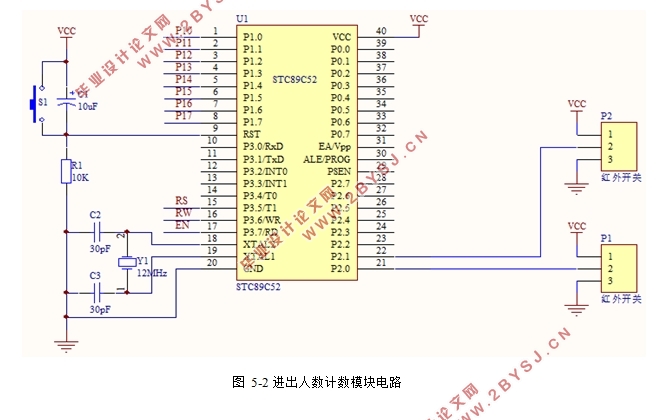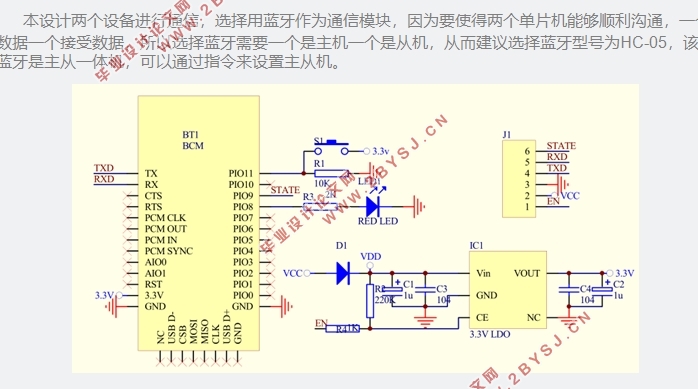基于单片机的教室节能控制系统设计
无需注册登录,支付后按照提示操作即可获取该资料.
基于单片机的教室节能控制系统设计(论文14000字,外文翻译,答辩PPT)
摘要:在现阶段,资源节约已经成为了一个重要的社会问题,但是我国在各个场所却普遍存在着严重的电能资源浪费的现象,这需要我们运用现代先进的科学技术对现有的资源系统进行升级和改造。本设计基于STC89C52单片机设计了一个系统,该系统可以根据室内的人数来控制教室内亮灯的个数,做到无人不亮灯,有人适量亮灯,达到节能减排的目的。同时可以通过显示屏显示室内的人数,可以作为上课的点名系统来使用,可以帮助老师准确掌握上课学生人数,节省点名时间,有利于提高老师的教学效率。本设计还加了一个温湿度传感器,实时测量室内温湿度并通过LCD显示屏反馈给教室内的人,使用了若干LED灯来表示室内灯的个数,在实际应用时可以根据具体情况进行运用,达到节能减排的作用。
关键词:红外线传感器;节能;温湿度传感器;单片机;人数统计
Design of the Energy-saving Control System based on MCU
Abstract : At present, resource conservation has become an importent social problem. But each place of our country exists serious energy resource waste phenomenon, which need us to use the advanced science and technology to upgrade and reform the existing resource system, this design created a energy saving control system based on STC89C52 microcontroller, which can control the number of bright lights in the classroom based on the number of people in the classroom, when nobody is in the classroom, no light will be turned on. And turn on the lights based on the number of people which can achieve the purpose of energy saving and emission reduction. Meanwhile, the display screen can display the number of people in the room, which can be uesd as a student’s nomination system to help the teachers accurately determine the number of students in class, save time and improve the teaching efficiency. The design also adds a temperature and humidity sensor which can measure indoor temperature and humidity real time and display them by the display screen, this design uses a number of LED lights to indicate the number of indoor lights, in application, it can be used according to specific conditions to save energy and reduct emission.
Key words : infrared sensor, energy saving, temperature and humidity sensor, MCU, people counting


目 录
1绪论 1
1.1课题研究目的及意义 1
1.2国内外研究现状 1
2系统的基本原理 2
3 系统的硬件设计部分 3
3.1单片机单元模块 4
3.2红外线传感器模块 4
3.3 温湿度传感器模块 5
3.3.1 温湿度传感器模块简介 5
3.3.2 温湿度传感器串行接口的工作原理 6
3.4模拟教室灯的LED模块 6
3.5 液晶显示模块 7
3.5.1 液晶显示模块简介 7
3.5.2 管脚功能说明 8
3.5.3 并行接口时序图 9
3.6电源模块 9
3.7复位电路模块 9
3.8 时钟电路模块 10
3.9 整体设计图 11
4 系统的软件设计部分 12
4.1 温湿度传感器程序模块 12
4.2 液晶显示屏程序模块 14
4.3 进出人员计数程序模块 16
4.4模仿教室灯的LED亮灯程序模块 19
5 多门通信扩展 20
5.1多门通信的基本原理 20
5.2硬件模块 21
5.2.1 进出人数计数模块 21
5.2.2 蓝牙模块 21
5.2.3蓝牙之间的配对 23
5.3软件程序思路方案 24
5.3.1 方案1 24
5.3.2方案2 24
5.3.3小结 25
6 系统实验与测试 25
6.1程序的编译与烧录 25
6.2 原理图设计 26
6.3 相关测试 27
6.4总结与展望 29
参考文献 31
致 谢 32
